PHISHING INDEX
Below are the most common email phishing attempts detected by the TG Soft Anti-Malware Research Center in May 2025:
26/05/2025 =>
Mailbox
25/05/2025 =>
SumUp
23/05/2025 =>
Sondrio Popular Bank
20/05/2025 =>
BRT
20/05/2025 =>
State Police
16/05/2025 =>
Carta BCC
12/05/2025 =>
Aruba
11/05/2025 =>
Survey - Telepass / Decathlon
05/05/2025 =>
Netflix
04/05/2025 =>
SumUp
03/05/2025 =>
Survey - CONAD / UNIPOL
01/05/2025 =>
FedEx
01/05/2025 =>
TELEPASS
These emails aim to deceive unsuspecting victims into providing sensitive information, such as bank account details, credit card codes, or personal login credentials, with all the easily imaginable consequences.
26 May 2025 ==> Mailbox
SUBJECT: <
E-mail Verification For Mailbox>
The short message, in English, informs the receiver that his/her size limit for Mailbox setup requires immediate response because incoming mails are being rejected. Since this is a minor technical issue the user just needs to revalidate before the countdown process is complete, through the following link.
VALIDATE NOW
Clearly the well-known company, is unrelated to the mass sending of these emails, which are real scams whose goal remains, as always, to steal the sensitive data of the unsuspecting recipient.
When we carefully analyze the message, we find some suspicious clues. First of all, the email address <i
nfo[at]cibl-digital[dot].com> is not traceable to the official domain of Mailbox. This fact is definitely anomalous and should, at the very least, make us suspicious. It is also abnormal that the user is asked to enter his or her account credentials via a link provided via email.
Anyone who unluckily clicks on the
VALIDATE NOW
link, will be redirected to an anomalous web page which has already been reported as DECEPTIVE WEBSITE/PAGE. In fact it is run by cyber-criminals whose goal is to get hold of your most valuable data in order to use it for illegalpurposes.
We always urge you to pay attention to even the smallest details and not to enter your personal data and/or passwords on forms hosted on counterfeit web pages, as they will be sent to a remote server and used by cyber crooks.
25 May 2025 ==> SumUp
SUBJECT:: <[*Suspicious Email*]
Check your email address>
Phishing attempts pretending to be communications from
SumUp, the London-based digital payments company, continue.
The message requests the recipient to confirm his/her e-mail address to ensure the security and proper functioning of the
SumUp account. To confirm, the user just needs to click on the following Link:
Confirm your email address now
The well-known company, is clearly unrelated to the mass sending of these emails, which are real scams whose goal remains, as always, to steal the sensitive data of the unsuspecting recipient.
If we analyze the message carefully,we see some suspicious clues. In fact, first of all, the email address <
pjeanne[at]myt[dot].mu>. cannot be traced back to the official domain of
SumUp. This fact is definitely anomalous and should, at the very least, make us suspicious. It also seems strange that the user is asked to enter his/her credentials to update his/her account via a link provided via email.
Anyone who unluckily clicks on the
Confirm your email address now link, will be redirected to an anomalous web page which has already been reported as DECEPTIVE WEBSITE/PAGE. In fact it is run by cyber-criminals whose goal is to get hold of your most valuable data in order to use it for illegal purposes.
We always urge you to pay attention to even the smallest details and not to enter your personal data and/or passwords on forms hosted on counterfeit web pages, as they will be sent to a remote server and used by cyber crooks.
23 May 2025 ==> Sondrio Popular Bank
SUBJECT: <
Information Update!>
We find again this month the phishing email that uses stolen graphics or similar to the graphics of a well-known banking institution to trick the victim into following instructions, and falling into a social engineering trap.
The message says: “
to ensure an optimal level of security, we invite you to update your master data registered with our systems” and urges the unsuspecting recipient to update his/her data using the following link:
Update now
We can see right away that the alert message comes from an e-mail address <
contact(at)advbooth(dot)com> that is highly suspicious and contains very general text, although the cybercriminal had the graphic foresight to include the well-known banking institution logo, that could mislead the user.
The purpose is to get the victim to log in to his or her banking app under the guise of updating master data.
Anyone who unluckily clicks on the
Update now link, will be redirected to an anomalous WEB page, which is unrelated to the official website of the well-known Banking Institution.
From the image on the side we can see that the web page is graphically well done and simulates fairly well the official banking portal site.
Given these remarks, we urge you to pay close attention to every detail, and remember to check the url address of the form before entering sensitive data, such as in this case home banking credentials i.e. User Code and PIN.
The landing page in this case is hosted on the url address:
https[:]//************[.]zd[.]fr/online/login[.]php
which is unrelated to the official website of the well-known banking institution.
This deceptive PAGE /SITE is run by cyber-criminals whose goal is to get hold of your most valuable data in order to use it for malicious purposes.
20 May 2025 ==> BRT
SUBJECT: <
Please confirm the delivery address BRT_120533>
We analyze below a new phishing attempt hiding behind a false communication from the well-known express courier
BRT.
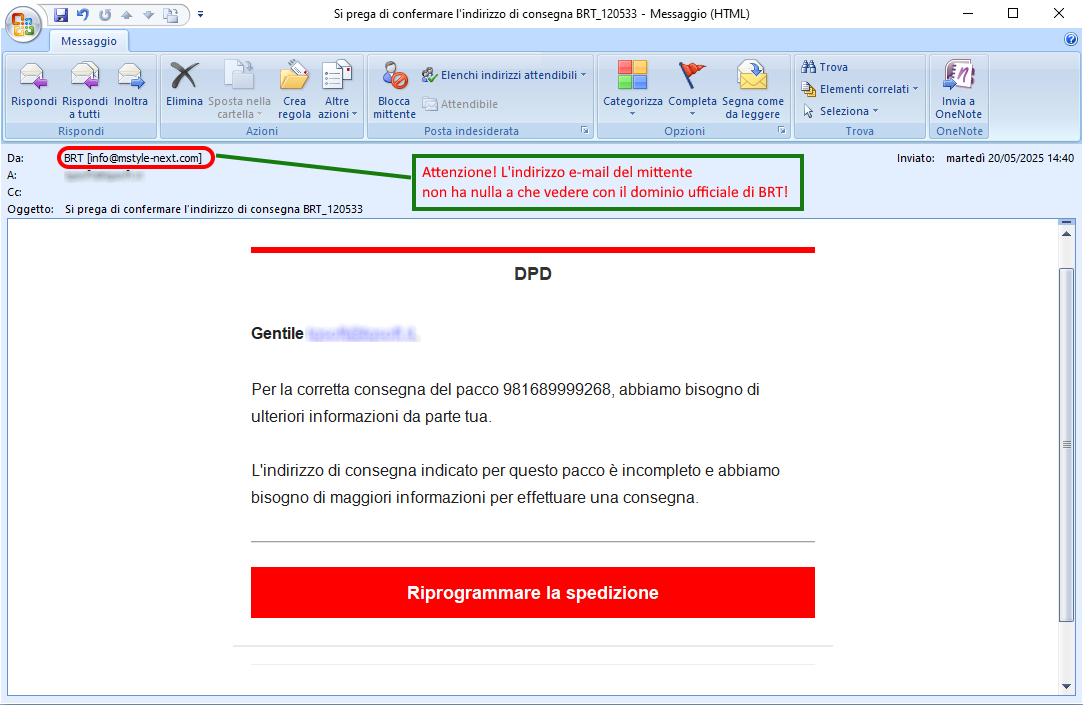
The message, which we quote on the side, refers to a pending shipment. It notifies the unsuspecting recipient that the delivery of the package could not be completed, due to incomplete recipient address.
It seems necessary to reconfirm the address and reschedule the shipment by clicking on the following link:
Reschedule the shipment
The first red flag about the authenticity of the alert is the origin of the message. In fact it comes from a very suspicious email address <
info[at]mstyle-next[dot]com>, not traceable to the
BRT courier. To mislead the user, it was reported a supposed tracking number of the order ''981689999268'' to allow tracking to be verified.
The purpose is clearly to lead the user to click on the provided link, which redirects to a web page that has, as always, the goal to induce the user to enter sensitive data.
Let’s analyze it below in detail.
From the link in the email we are redirected to a page that is supposed to simulate the official website of the BRT courier company. The page, graphically well designed, shows the tracking of the shipment and invites the recipient to update the shipment data within 2 working days, otherwise the package will return to the sender. To continue we need to click on Schedule a new delivery.
Then we are redirected to the following screen where we are asked to reschedule the shipment, choosing one of the two available dates. And here is another anomalous detail: in order for the delivery to take place, additional shipping charges of 2 Euros for faster shipping or 1 Euro must be paid...
After clicking on
Continue we are redirected to a data entry FORM that requests: ''First Name'', ''Last Name'' ''Address'' "City" ''Phone Number''. We assume that as we continue with data entry, we will also be asked for credit card information to pay for the shipping costs of the package.
We observe that the form page is hosted on a url address that is completely untrusted and unrelated to
BRT.
The purpose is to prompt the user to enter his or her personal data.
On the side we show in detail the screenshot of the completion form.
To conclude, we always urge you to be wary of any email that asks for confidential data, and avoid clicking on suspicious links that could lead to a counterfeit site difficult to distinguish from the original, putting your most valuable data in the hands of cyber crooks, who can use it at will.
20 May 2025 ==> State Police SCAM
«SUBJECT: <
Subpoena, State Police Cybercrime Department🚨>
The following is an attempt at SCAM, which notifies a summons against the victim.
The message, that comes through a suspicious e-mail address <s
1593221[at]edu[dot]moe[dot]om>, contains a .jpg attachment called <
Ref-It>. The text is very concise and explains that the citation depends on the detection by the Police monitoring system of the <presence of pornographic sites with minors> in the recipient's internet traffic.
The graphically deceptive attachment we see below, concerns a false child pornography citation allegedly from
"Mr Vittorio Pisani Secretary of State for Security." The victim is supposedly under investigation for child pornography, paedophilia, exhibitionism and cybernetic pornography for visiting a child pornography site.
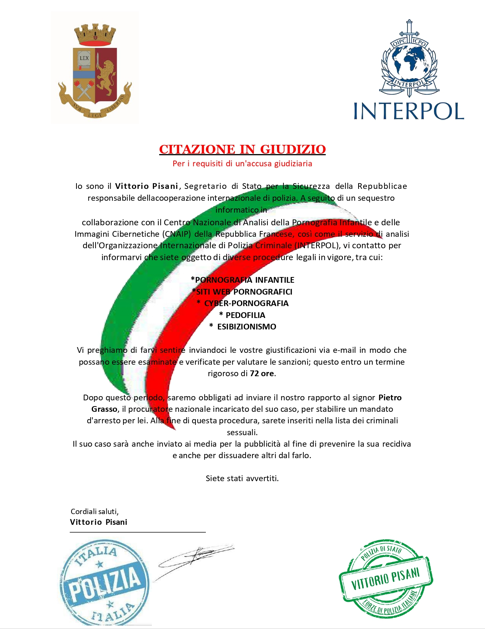
This is an attempted scam by cyber criminals, whose aim is to extort a sum of money, in this case in the form of a fine. In fact, the message reads as follows:
"
Please make yourselves heard by sending us your justifications by e-
e-mail so that they can be examined and verified for sanctions; this within a strict deadline of 72 hours.."
If the victim does not respond within 72 hours, an immediate arrest warrant will be issued.
It is quite easy to realise that it is a false complaint, because first of all it is not personal, and secondly, the document contains a very suspicious stamp.
This is clearly an attempt at fraud with the aim to steal sensitive user data and extort money.
16 May 2025 ==> BCC Card
SUBJECT: <
Confirm your identity !>
We analyze below a new phishing attempt aimed at stealing the account login credentials of
BCCCard, the well-known Cooperative Credit Bank.
The message informs the recipient that, for security reasons, the access to his/her account has been temporarily restricted.
Once his/her personal information is updated, it will be possible to gain full access to the account. Until then, the account will remain restricted. To proceed with the update the user just needs to click on the following link:
https[:]//www[.]cartabcc[.]it/Pagine/default[.]aspx
When we analyze the message we notice that it has an email address <
support[at]dali[dot].ro> clearly not traceable to the official domain of
BCCCard .This is definitely anomalous and should, at the very least, make us suspicious.
Anyone who unluckily clicks on the provided link, will be redirected to an anomalous web page which has already been reported as DECEPTIVE WEBSITE/PAGE. In fact it is run by cyber-criminals whose goal is to get hold of your most valuable data in order to use it for criminal purposes.
Based on these considerations, we recommend that you NEVER enter your credentials on sites whose origin you do not know, as they will be sent to a remote server and used by cyber crooks with all the associated, easily imaginable, risks.
12 May 2025 ==> Aruba - ICANN fee
SUBJECT: <
[ARUBA Italy] ICANN Fee Invoice 2025 Attached>
Phishing attempts, pretending to be communications from the
Aruba, brand continue.
The message informs the recipient that the invoice for payment of the annual ICANN (Internet Corporation for Assigned Names and Numbers) fee, for the registration of his/her domain hosted on
Aruba, is due. It then shows that the invoice expires on
10 May 2025, and requests the payment of Euro 2.00. The following link is provided for the payment:
Pay Now
Clearly, the well-known web hosting, e-mail and domain registration services company
Aruba, is uninvolved in the mass sending of these e-mails, which are real scams whose objective remains, as always, to steal sensitive data of the unsuspecting recipient.
Anyone who unluckily clicks on the
Pay Now link, will be redirected to an anomalous web page which has already been reported as DECEPTIVE WEBSITE/PAGE. In fact it is run by cyber-criminals whose goal is to get hold of your most valuable data in order to use it for illegal purposes.
11 May 2025 ==> Phishing customer survey: Telepass / Decathlon
Customer survey-themed phishing campaigns, exploiting well-known brands, continue. The two cases below, involve large-scale retail and mobility services companies.
In the first reported example, the cybercriminal used the well-known brand name of
Decathlon, to launch a promotional message that would allow the recipient to win an exclusive prize <
Quechua Hiking Equipment Package>. To claim the prize, recipients just have to answer a few short questions.
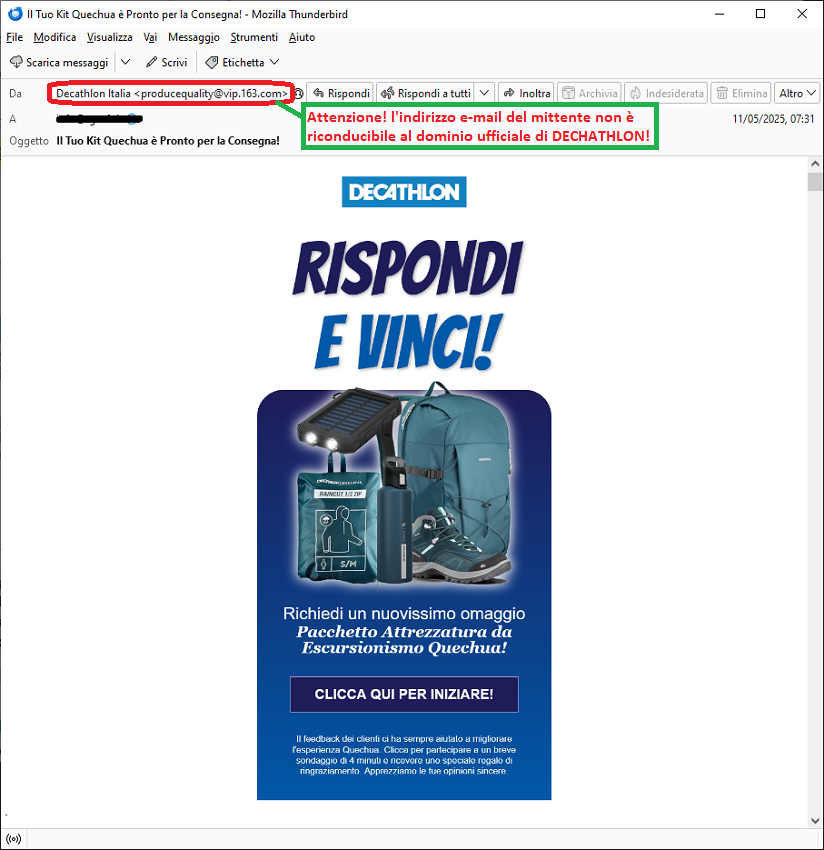
In the second reported example, a <
Car Emergency Kit > is supposedly offered as a prize by
Telepass, and it can again be claimed by participating in a short survey....
The brands exploited in these campaigns are clearly unrelated to the mass sending of these malicious e-mails, which are outright scams whose goal remains, as always, to steal sensitive data of the unsuspecting recipient.
In the two examples above we see that the emails clearly come from addresses <
producequality[at]vip[dot]163[dot]com> and <i
t651023sd[at]fedracasa[dot]com>. unrelated to the official domain of
Decathlon or
Telepass. This is definitely anomalous and should certainly make us suspicious.
If we click on the links in the email, we are redirected to a landing page that, although graphically deceptive (with misleading images and the brand's authentic logo), is hosted on an anomalous address/domain, which does not seem at all trustworthy or traceable to the exploited brand.
The cybercriminals behind the scam, in order to achieve their goal, use various tricks, such as reporting false testimonials from customers who have won the prize. They try to persuade the user to complete the survey quickly, by making him/her believe that only a few can win, and that the offer expires today.
Surely if so many users were lucky why not try our luck?
When the survey is completed, the user is usually redirected to a page for the entry of the shipping address and subsequent payment of shipping costs.
The cybercriminals' purpose, is to induce the victim to enter his/her personal information to ship the prize and then, likely, also the credit card information to pay the shipping costs.
To conclude, we always urge you to be wary of advertising/promotional messages that boast of "giving away" valuables, and avoid clicking on suspicious links that may lead to a counterfeit site. In fact, if you trust these messages, your most valuable data is stolen by cyber crooks who can use it at will.
05 May 2025 ==> NETFLIX
«SUBJECT:
<Action Required: Verify Your Subscription Payment Information>
Let’s examine the following phishing attempt, that comes as a fake communication from
NETFLIX, - the well-known streaming distribution platform of movies, TV series and other paid content - and that aims to steal the credit card details of the victim.
The message informs the user that his/her membership has expired, but as part of the loyalty programme he/she can extend the membership for 90 days FREE OF CHARGE! However, he/she needs to hurry as the offer expires soon. The following link is provided for membership extension:
Update data
When we examine the e-mail, we notice that the message comes from an e-mail address <
evaa(at)fisioterapiaspedale(dot)it> that cannot be traced back to the official domain of
NETFLIX. This is definitely anomalous and should, at the very least, raise our suspicions.
Anyone who unluckily clicks on the
Update data link, will be redirected to an anomalous web page which has already been reported as DECEPTIVE WEBSITE/PAGE. In fact it is run by cyber-criminals whose goal is to get hold of your most valuable data in order to use it for illegal purposes.
04 May 2025 ==> SumUp
SUBJECT: <
Check your email address>
We analyse below a new phishing attempt aimed at stealing the account login credentials of
SumUp, the London-based digital payments company.
The message asks the recipient to confirm his or her e-mail address linked to his or her
SumUp account, via the link provided, to ensure the functionality and security of his or her account.
Confirm your email address
When we examine the message, we see that it comes from an email address <
mediaworld7711[at]assistenzaanzianitoscana[dot].it> that is clearly not traceable to the official domain of
SumUp. This is definitely anomalous and should, at the very least, make us suspicious.
Anyone who unluckily clicks on the
Confirm your email address
link, will be redirected to an anomalous WEB page which has already been reported as DECEPTIVE WEBSITE/PAGE. In fact it is run by cyber-criminals whose goal is to get hold of your most valuable data in order to use it for malicious purposes.
03 May 2025 ==> Phishing customer survey: UNIPOL / CONAD
Customer survey-themed phishing campaigns, exploiting well-known brands, continue. The two cases below involve large-scale retail companies and insurance companies.
In the first reported example, the cybercriminal used the well-known brand name of
CONAD, to launch a promotional message that would allow the recipient to win an exclusive prize <
A 36-piece Tupperware Modular Mates Se
t>. To claim the prize, recipients just have to answer a few short questions.
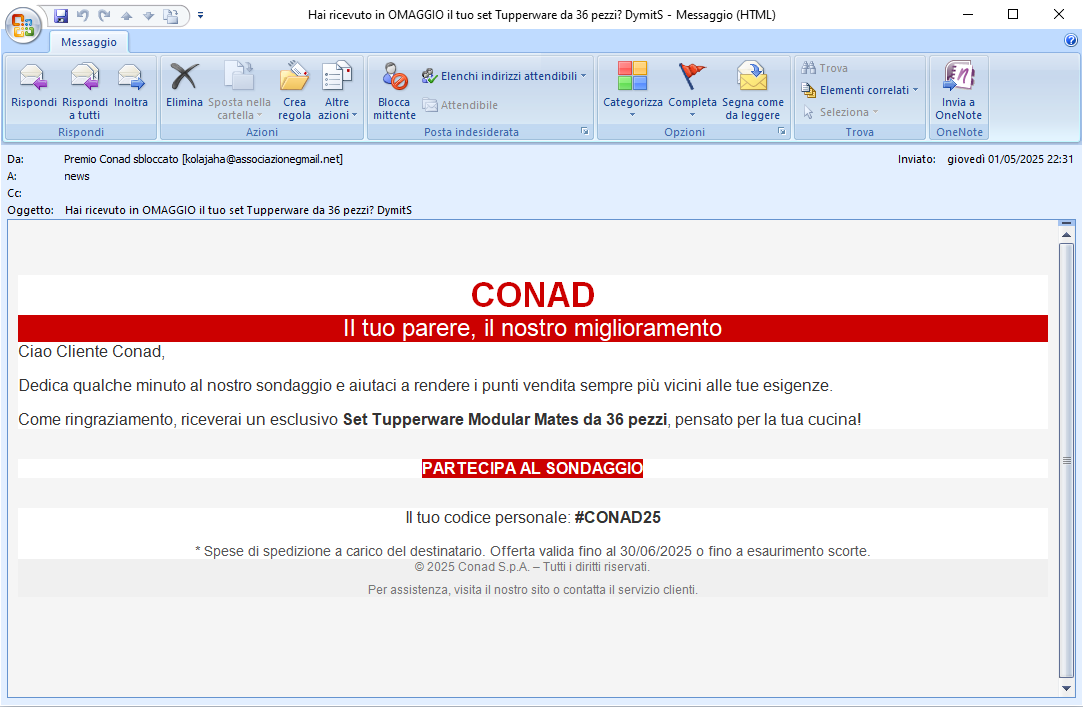
In the second reported example, a <
Car Emergency Kit > is supposedly offered as a prize by
UNIPOL, and it can again be claimed by participating in a short survey.
The brands exploited in these campaigns are clearly unrelated to the mass sending of these malicious e-mails, which are outright scams whose goal remains, as always, to steal sensitive data of the unsuspecting recipient.
In the two examples above we see that the emails clearly come from addresses <
kolajaha[at]associazionegmail[dot]net> and <
unipo7826[at]ediliziacincidda[dot]it>unrelated to the official domain of
CONAD or
UNIPOL. This is definitely anomalous and should certainly make us suspicious.
If we click on the links in the email, we are redirected to a landing page that, although graphically deceptive (with misleading images and the brand's authentic logo), is hosted on an anomalous address/domain, which does not seem at all trustworthy or traceable to the exploited brand.
The cybercriminals behind the scam, in order to achieve their goal, use various tricks, such as reporting false testimonials from customers who have won the prize. They try to persuade the user to complete the survey quickly, by making him/her believe that only a few can win, and that the offer expires today.
Surely if so many users were lucky why not try our luck?
When the survey is completed, the user is usually redirected to a page for the entry of the shipping address and subsequent payment of shipping costs.
The cybercriminals' purpose, is to induce the victim to enter his/her personal information to ship the prize and then, likely, also the credit card information to pay the shipping costs.
To conclude, we always urge you to be wary of advertising/promotional messages that boast of "giving away" valuables, and avoid clicking on suspicious links that may lead to a counterfeit site. In fact, if you trust these messages, your most valuable data is stolen by cyber crooks who can use it at will.
01 May 2025 ==> FedEx
SUBJECT: <
FedEx: action required to complete package delivery 789###123>
Let's analyze a new phishing attempt that aims to steal the login credentials of a
FedEx account, the international shipping company.
The message informs the recipient that the
FedEx-paid shipment is awaiting instructions. It then invites him/her to complete the order to receive the shipment by clicking on the following link:
Display your order
When we analyze the message, we see that it comes from an email address <
commerciale[at]nuovafloricoltura[dot].it> that is clearly not traceable to the official domain of
FedEx. This is definitely anomalous and should, at the very least, make us suspicious.
Anyone who unluckily clicks on the
Display your order link, will be redirected to an anomalous WEB page which has already been reported as DECEPTIVE WEBSITE/PAGE. In fact it is run by cyber-criminals whose goal is to get hold of your most valuable data in order to use it for malicious purposes.
01 May 2025 ==> TELEPASS
SUBJECT: <
[ G-5097 ] - Your Telepass Emergency Kit is waiting for you!>
Below we analyze the attempted scam, hidden behind false communications by the well-known Italian company
TELEPASS working in the urban and suburban mobility services industry.
It is a graphically and textually well-crafted message that aims to make the user believe that he or she is facing a real unmissable opportunity. The lucky user has been selected as the winner of a fantastic prize, or at least that's what it looks like: a new "
emergency car kit premium", which can be claimed by participating in a short survey...
Certainly this phishing is a real decoy for many inexperienced users.
Clearly the well-known company
TELEPASS is uninvolved in the mass mailing of these malicious campaigns, which are real scams whose goal remains, as always, to steal sensitive data of the unsuspecting recipient.
So keep an eye out. All it takes to avoid unpleasant incidents, is a little attention and a quick glance.
We immediately see that the message comes from an email address <sentisi[at]dtihost[dot]com> clearly not traceable to the official domain of
TELEPASS. This is definitely anomalous and should, at the very least, make us suspicious. However, if we go ahead and click on the link in the emails here is what happens:
we are redirected to a landing page that, although graphically well designed (with misleading images and the authentic logo of
TELEPASS.) does not seem trustworthy at all.
In fact, the survey is hosted on the following anomalous address/domain:
https[:]//[FakeDomainName*]....
which has no connection with
TELEPASS.
Cyber criminals masterminding the scam, try to induce the user to quickly finish the survey, by making him/her believe that only few people can win, and the offer expires in the day. There is also a countdown timer at the bottom of the screen, which however, if stopped - as we simulated - will start over immediately. This is a rather strange thing.
When we click on
START THE SURVEY link, we are taken to the next screens, where we are asked to answer 8 questions.
Here is specifically question 1/8. These are very general questions focused on the degree of satisfaction with the services offered by
TELEPASS and about the company's marketing/promotional choices. Here, too, there is a countdown to prompt the user to quickly finish the process for the award.
When the survey is over we can finally claim our prize: an emergency car kit premium that would be worth 99,95 Euros but costs us 0 Euros. We only have to pay e Euros of shipping costs.
But let's hurry. It seems there are only 5 left in stock.
Here we go: in fact, all you need to do is to enter your shipping address and pay the shipping cost, and in 5-7 business days the prize will be delivered....
To give more credibility, many comments from customers who supposedly participated in the survey, have been reported. These are all confirming testimonials/feedback about the actual delivery of the winnings, ensuring that it is not really a scam.....
Surely if so many users were lucky why not try your luck?
Then, when we click on
Continue link, we are directed to a further page to enter our shipping address and pay shipping costs.
As we can see from the image on the side, the cybercriminals try to trick the victim into entering his/her sensitive data to ship the prize. Most likely, credit card information will also be requested later for the payment of shipping costs of Euro 1,98. The page where we are redirected, to enter our personal data, is hosted on a new abnormal address/domain, which we report below:
https[:]//[FakeDomainName*][.]com
To conclude, we always urge you to be wary of advertising/promotional messages that boast of "giving away" valuables, and avoid clicking on suspicious links that may lead to a counterfeit site. In fact, if you trust these messages, your most valuable data are placed in the hands of cyber crooks who can use them at will.
A little bit of attention and glance can save a lot of hassles and headaches...
We urge you NOT to be fooled by these types of e-mails, which, even though they use familiar and not particularly sophisticated approach techniques, if there is a resurgence, with reasonable likelihood more than a few unfortunates will be fooled.
We invite you to check the following information on phishing techniques for more details:
03/02/202514:54 - Phishing: the most common credential and/or data theft attempts in February 2025...
03/01/2025 14:40 - Phishing: the most common credential and/or data theft attempts in January 2025...
03/12/2024 14:47 - Phishing: the most common credential and/or data theft attempts in December 2024...
06/11/2024 14:33 - Phishing: the most common credential and/or data theft attempts in November 2024...
07/10/2024 14:33 - Phishing: the most common credential and/or data theft attempts in October 2024...
04/09/2024 09:28 - Phishing: the most common credential and/or data theft attempts in September 2024
06/08/2024 14:50 - Phishing: most popular credential and/or data theft attempts in August 2024...
04/07/2024 17:22 - Phishing: the most common credential and/or data theft attempts in July 2024.
03/06/2024 17:22 - Phishing: the most common credential and/or data theft attempts in June 2024..
03/05/2024 11:56 - Phishing: the most common credential and/or data theft attempts in May 2024..
03/04/2024 10:23 - Phishing: the most common credential and/or data theft attempts in April 2024...
04/03/2024 10:42 - Phishing: the most common credential and/or data theft attempts in March 2024..
Try Vir.IT eXplorer Lite
 If you are not yet using Vir.IT eXplorer PRO, it is advisable to install Vir.IT eXplorer Lite -FREE Edition- to supplement the antivirus in use to increase the security of your computers, PCs and SERVERS.
If you are not yet using Vir.IT eXplorer PRO, it is advisable to install Vir.IT eXplorer Lite -FREE Edition- to supplement the antivirus in use to increase the security of your computers, PCs and SERVERS.
Vir.IT eXplorer Lite has the following special features:
- freely usable in both private and corporate environments with Engine+Signature updates without time limitation;
- fully interoperable with other AntiVirus software and/or Internet Security products (both free and commercial) already installed on your computer. It doesn't need any uninstallation and it doesn't cause slowdowns, as some features have been appropriately reduced to ensure interoperability with the AntiVirus software already on your PC/Server. This, however, allows cross-checking through the scan;
- it identifies and, in many cases, even removes most of the viruses/malware actually circulating or, alternatively, allows them to be sent to the C.R.A.M. Anti-Malware Research Center for further analysis to update Vir.It eXplorer PRO;
- through Intrusion Detection technology, also made available in the Lite version of Vir.IT eXplorer, the software is able to report any new-generation viruses/malware that have set in automatically and send the reported files to TG Soft's C.R.A.M
- Download Vir.IT eXplorer Lite from the official distribution page of TG Soft's website.
VirIT Mobile Security AntiMalware ITALIAN for ALL AndroidTM Devices
VirIT Mobile Security Italian Anti-Malware software that protects Android™ smartphones and tablets, from Malware intrusions and other unwanted threats, and empowers the user to safeguard his/her privacy with an advanced heuristic approach (Permission Analyzer).
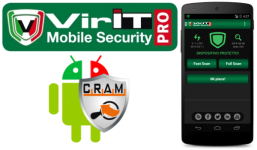
TG Soft makes VirIT Mobile Security available for free by accessing the Google Play Store market (https://play.google.com/store/apps/details?id=it.tgsoft.virit) from which you can download the Lite version, which can be freely used in both private and corporate settings.
You can upgrade to the PRO version by purchasing it directly from our website=> click here to order
Acknowledgements
TG Soft's Anti-Malware Research Center would like to thank all users, customers, reseller technicians, and all people who have transmitted/reported material attributable to Phishing activities to our Research Center, that allowed us to make this information as complete as possible.
How to submit suspicious emails for analysis as possible phishing but also virus/malware or Crypto-Malware
You can submit materials to TG Soft's Anti-Malware Research Center safely and free of charge in two ways:
- any suspect email can be sent directly by the recipient's e-mail, to the following mail lite@virit.com,choosing as sending mode "Forward as Attachment" and inserting in the subject section "Possible phishing page to verify" rather than "Possible Malware to verify";
- save the e-mail to be sent to TG Soft's C.R.A.M. for analysis as an external file to the e-mail program used. The resulting file must be sent by uploading it from the page Send Suspicious Files (http://www.tgsoft.it/italy/file_sospetti.asp). Obviously if you want a feedback on the analysis of the data submitted, you have to indicate an e-mail address and a brief description of the reason for the submission (for example: possiible / probable phishing; possible / probable malware or other).
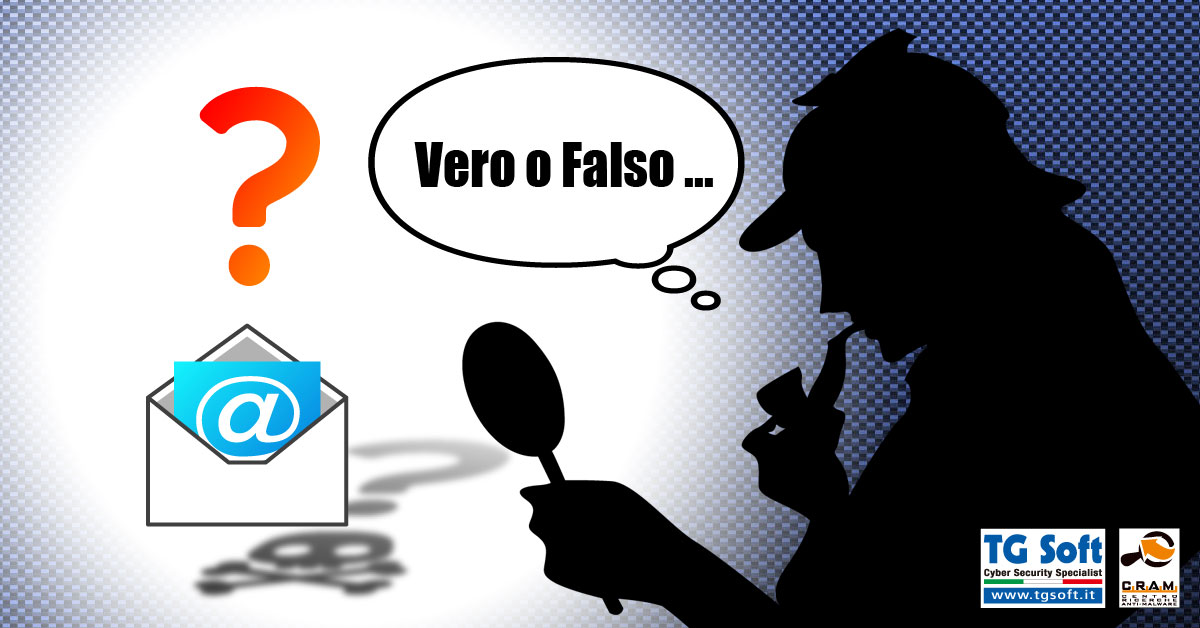
For more details on how to safely forward suspicious e-mails, we invite you to consult the following public page:
How to send suspicious emails for analysis
We provide all this information to help you prevent credential theft, viruses/malware or, even worse, next-generation Ransomware / Crypto-Malware.
TG Soft Anti-Malware Research Centre (C.R.A.M.


 This is an attempted scam by cyber criminals, whose aim is to extort a sum of money, in this case in the form of a fine. In fact, the message reads as follows:
This is an attempted scam by cyber criminals, whose aim is to extort a sum of money, in this case in the form of a fine. In fact, the message reads as follows: If you are not yet using Vir.IT eXplorer PRO, it is advisable to install Vir.IT eXplorer Lite -FREE Edition- to supplement the antivirus in use to increase the security of your computers, PCs and SERVERS.
If you are not yet using Vir.IT eXplorer PRO, it is advisable to install Vir.IT eXplorer Lite -FREE Edition- to supplement the antivirus in use to increase the security of your computers, PCs and SERVERS. For more details on how to safely forward suspicious e-mails, we invite you to consult the following public page: How to send suspicious emails for analysis
For more details on how to safely forward suspicious e-mails, we invite you to consult the following public page: How to send suspicious emails for analysis